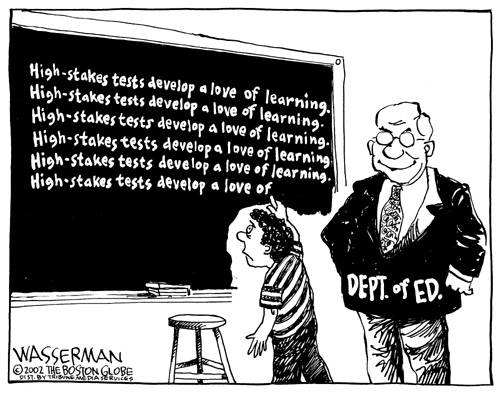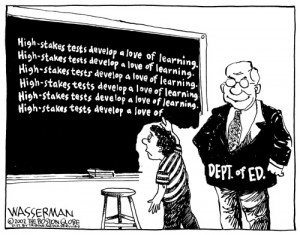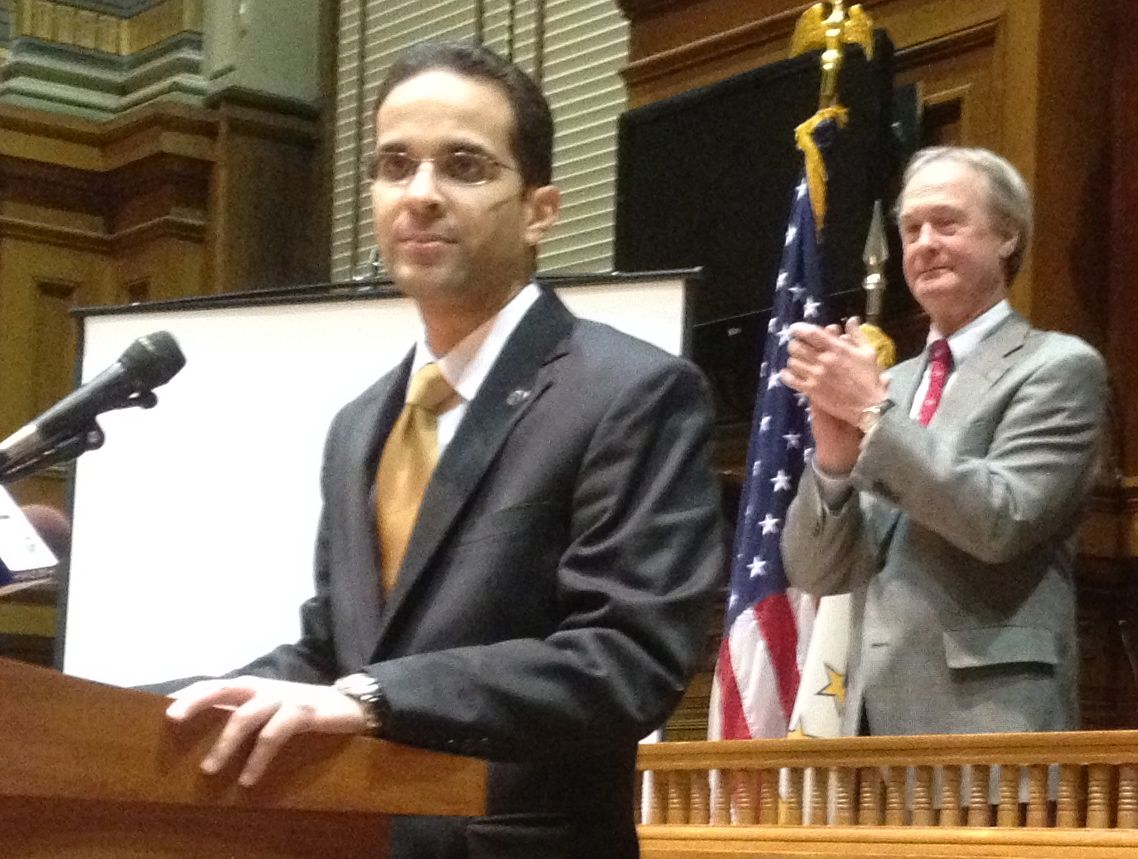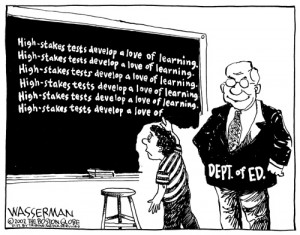There was apparently quite a party in Cranston yesterday, with several hundred teachers coming together to, well, you wouldn’t say they were there to praise the state Education Commissioner, Deborah Gist. In a poll out a couple of weeks ago, 85% of teachers say they don’t approve of the commissioner or the current policies of the state Department of Education.
 I think a number of friends I’ve spoken to about this poll don’t appreciate how remarkable a result it is. One of the little secrets of unions is that they don’t usually have unanimous support of their members, and independent polling generally bears that out. It is the rare union that has 85% support on most of what it does. In other words, Commissioner Gist has given a remarkable boost to union solidarity.
I think a number of friends I’ve spoken to about this poll don’t appreciate how remarkable a result it is. One of the little secrets of unions is that they don’t usually have unanimous support of their members, and independent polling generally bears that out. It is the rare union that has 85% support on most of what it does. In other words, Commissioner Gist has given a remarkable boost to union solidarity.
On the same subject, there was an interesting letter last week, written to the Board of Education and signed by the directors of 20 different business organizations, like the Greater Providence Chamber of Commerce and the Rhode Island Public Expenditure Council. The writers praised Commissioner Gist’s “admirable leadership” and begged her contract be renewed in June.
To be honest, I was being kind and it actually wasn’t that interesting a letter. It mostly consisted of the usual boilerplate, reciting familiar facts about our state’s economy and the educational condition of our citizens. Then it goes on to praise Gist for the mere establishment of policies and the winning of grants, and her willingness to “take bold action for reform.” These are nice things, to be sure, but who would mistake them for actual achievements? The policies, you might have noticed, are fairly controversial, and the evidence that they will work is, well, thin. Bold action certainly sounds nice, but invading Iraq was pretty bold, too. How did that work out for us? If you care more about results than about show, the letter showed some curious priorities.
The thing that came closest to being interesting about the letter was that it referenced our lag behind neighboring states on the national NAEP test scores. This is true, but it is not the only thing shown by those scores and I wonder how many of the letter’s signers have spent time examining Rhode Island’s NAEP results.
To review, the national NAEP tests are widely described as the “gold standard” of testing. They are administered nationally and the data are considered quite reliable, largely because no one has an incentive to game the results. They are administered in the 4th and 8th grades, in reading and math. (I gather there will be high school tests in the future, but there is no past data for now.)
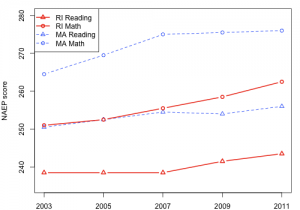
NAEP average figures are shown in the figure, where you can see that Rhode Island scores (red lines) have been steadily climbing for several years. For simplicity, these are averages of the 4th and 8th-grade test scores in the two subjects, but there are similar stories in all the disaggregated scores. Yes, Massachusetts students (blue lines) score higher than ours, but are the red lines in the graph a record of dismal achievement rescued by Governor Don Carcieri’s 2009 appointment of Deborah Gist? That’s not what they look like to me.
To me, the NAEP results seem somewhat encouraging. They say we still have some hard work to do to catch up to our neighbors, but we embarked on an upward path several years ago. The last data point belongs to the current commissioner, but there is no story to tell here of the triumph of her policies: some categories see a slight uptick and some are slightly down. If she wants to take credit for the accelerating improvement in 8th-grade math scores, she’ll also have to take blame for the slowing improvement in 4th-grade reading scores. In all cases, the encouraging trends were underway years before her arrival.
Monday also saw the release of another letter, from 25 community groups, including the Urban League, the ACLU, RI Legal Services, and the Providence Student Union, urging the Board of Education to reconsider the Commissioner’s disastrous revamp of the high school graduation requirements. Unlike the business leaders, who praised the show of establishing policies and talk about “bold action”, this letter focused on a specific policy — the change in graduation requirement — and its bad effects on students. In other words, these guys are paying attention to the facts on the ground, not the nice words about them. Which one matters more?
The truth is that policy is where rubber meets road. It’s not about the show and about who cuts the most vigorous figure as a leader. It’s not about the hair or the smile, the cut of a suit, or the right kinds of friends. Debates like these ought to be about facts and the policies to address those facts. Policy is what the government does — for you and to you. To focus on the personalities behind it is entirely to miss the point. You’d think this is something folks who think of themselves as business leaders would understand, but the evidence is, well, thin.



